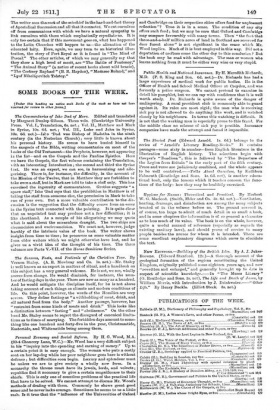SOMF; BOOKS OF THE WEEK.
[Under this Rending or notice such Books of ths week as haws wet bun reserved, ,for review in other felons.] The Commentaries of Isho Dad of Merv. Edited and translated by Margaret Dunlop Gibson. Three vols. (Cambridge University Press. Vol. I., Translation, 6s, net. ; Vol. II., Matthew and Mark in Syriac, 10s. 6d. net. ; Vol. III., Luke and John in Syriac, 10s. 6d. net.)—Isho 'Dad was Bishop of Hadatha in the ninth century (in the Nestorian Church) ; very little is known about his personal history. He seems to have busied himself in the exegesis of the Bible, writing commentaries on most of the Looks of the Old Teetament—the Prophets, however, not appearing ia the list.--and on the Gospels and the Pauline Epistles. Here we have the Gospels, the first volume containing the Translation, vith an interesting Introduction; the second and third the Syriac Last. Ho was an expert, we can see, in harmonizing and alle- gorising. There is, for instance, the difficulty, in the account of the Mission of the Twelve, that in Matthew they are forbidden to take even a staff, but in Mark are told to take a staff only. This has exercised the ingenuity of commentators. Grotius suggests "a spare staff," Isho 'Dad says that the prohibition in Matthew is of taking the staff from someone else, the permission in Mark to take one of your own. But a more valuable contribution to the dis- cussion is the suggestion that the difficulty comes from an error in the Syrian text connected with the pointing. It is quite clear that an unpointed text may produce not a few difficulties; it is like shorthand. As a sample of his allegorizing we may quote what is said about the ineraculona draught. The two ships are circumcision and uncirciuncision. We must not, however, judge harshly of the intrinsic value of the book. The writer shows insight from time to time he preserves us some valuable matter from older writers which we might otherwise have lost, and he gives us a vivid idea of the thought of his time. The three volumes are Parts V.-VII. of the Home Serniticae Series.






































 Previous page
Previous page